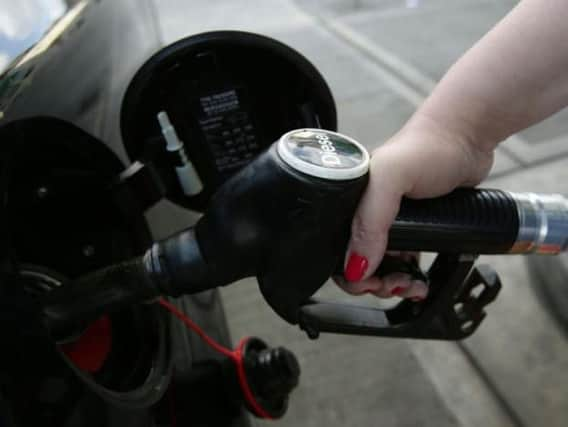"Limited" scrappage scheme for most polluting cars floated


The possible measure is part of a UK-wide consultation over cutting nitrogen dioxide levels around roads “as soon as possible”, which ministers described as “the most immediate air quality challenge”.
It would dovetail with the Scottish Government’s plans for the country’s first low emission zone, to be established by next year.
Advertisement
Hide AdAdvertisement
Hide AdAir pollution is linked to an estimated 40,000 early deaths a year.
Most parts of the UK are exceeding European Union limits for nitrogen dioxide, much of which comes from diesel engines.
They include across the Central Belt, Fife, Perth & Kinross, Dundee, Aberdeen and the Highlands.
However, it has emerged that the scrappage scheme may involve just 15,000 diesel and petrol vehicles - only 0.05 per cent of the total - being replaced with electric cars.
A report from the UK’s Department of Environment, Food and Rural Affairs said drivers would be paid £8,000 to trade in 9,000 diesel cars and 6,000 petrol cars for electric models.
The figure was based on a similar French scheme, and would cost £110 million..
However, the document added: “The net present value (NPV) for this option is estimated to be -£20 million.
“It is negative because the estimated costs of offering grants to the participants of the scheme significantly outweigh the benefits that it has been possible to quantify.”
Advertisement
Hide AdAdvertisement
Hide AdThe report also said: “The NPV is the primary criterion for deciding whether government action can be justified.”
It added that there would be significant other benefits, such as encouraging more electric vehicle sales, but these were not possible to quantify financially.
The document ruled out scrapping all but the diesel cars with the cleanest engines - nearly a quarter of all cars - because of its £60 billion cost.
The consultation includes views being sought on whether a scheme should go ahead.
That falls short of reports on Wednesday that a scheme would be launched - which received a lukewarm or negative response from the motoring industry and environmental campaigners.
Using cautious language, the consultation document stated: “Some have suggested that a targeted scrappage scheme for older, more polluting vans or cars could be developed to contribute to the cost of purchasing a cleaner vehicle.
“Such a scheme would have to be targeted at those most in need of support and be limited in scope.
“It will be important to consider the viability of any scheme and its overall cost.
Advertisement
Hide AdAdvertisement
Hide Ad“Any scheme would need to provide value for money, target support where it was most needed, be deliverable at local authority level and minimise the scope for fraud.”
Other consultation proposals include central funding for measures ranging from redesigning roads to boosting infrastructure for walking, cycling and electric vehicles.
There could be support for councils to retrofit cleaner engines to buses, taxis and lorries to reduce harmful emissions.
Ministers said councils should also consider other changes such as “improving road layouts and junctions to optimise traffic flow, for example by considering removal of road humps”.
The UK Government was ordered to draw up the new clean air plans following a court challenge by environmental lawyers ClientEarth.
The High Court in London ruled that existing government proposals to meet EU-mandated pollution limits were not sufficient, and new plans could not be postponed until after next month’s general election.
Neil Greig, the Scotland-based policy and research director of the IAM RoadSmart motoring group, said: “We can certainly support the targeted replacement of the oldest diesels, but there is no strong case for banning new models or blanket measures that cover rural areas or cities and towns which don’t have problems.
“Investing to reduce congestion is a good idea, although removing speed humps is only likely to happen in clean air zones as part of a bigger package of measures.
Advertisement
Hide AdAdvertisement
Hide Ad“We would like to see councils using their roadside emission testing powers to target badly-maintained vehicles so they get fixed or removed.
“The strategy also misses out the important role of driving style and the benefits of eco-driving courses.”
AA president Edmund King said: “Seven in ten of our members support a diesel scrappage scheme.
“However, older diesel cars in urban areas are only a small part of the problem.
“The 10 per cent of gross polluters that cause 50 per cent of the problem tend to be the older buses, trucks and taxis, and so these should be targeted first.”
But, Emilia Hanna, air pollution campaigner for Friends of the Earth Scotland, said: “Cars are not the solution to air pollution and climate change - walking, cycling, and using public transport are.
"Only a big emphasis on supporting sustainable transport will bring about the seismic shift we need to cut unnecessary car use and help the millions who don’t have access to a car.
"In Scotland, this means creating more low emission zones, more support for walking and cycling, and fixing the mess of our bus services through introducing re-regulation."
Advertisement
Hide AdAdvertisement
Hide AdGreenpeace UK chief scientist Dr Doug Parr said: "This hodge-podge of vague proposals offers little help and no justice to drivers duped by car companies and people breathing toxic air pollution.
"The only real winners are the car makers who despite misleading customers about their cars' real emissions and causing this mess in the first place are getting off scot-free."
Mike Hawes, chief executive of the Society of Motor Manufacturers and Traders, said: "Industry is committed to improving air quality across our towns and cities and has spent billions developing new low emission cars, vans, trucks and buses, and getting these new cleaner vehicles onto our roads quickly is part of the solution.
"Any proposed scrappage scheme would need to be targeted and deliver clear environmental benefits."